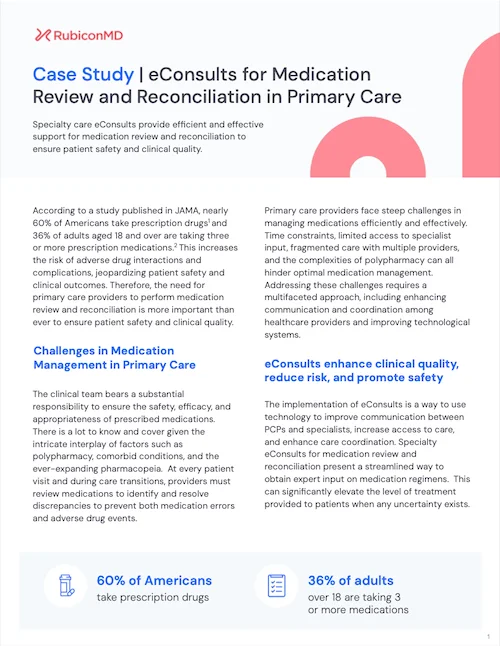eConsults Reduce Specialty Care Fragmentation for Medicare and Medicaid Patients
Primary care providers managing Medicare and Medicaid populations routinely care for patients with multiple chronic conditions, limited access to specialists,…
With the noticeable rise in the aging population in the US, there is more to be highlighted around the specific healthcare needs and advocacy for the senior LGBTQIA+ community.
In honor of Pride Month this year, RubiconMD collaborated with Oak Street Health (OSH) to host a virtual panel on Senior Care in the LGBTQIA+ Community, moderated by Dr. Rebecca Anastos-Wallen, Medical Director, Clinical Services at OSH. Panel members included clinicians with expertise in LGBTQ+ care: Dr. Peter Meacher, CMO at Callen Lorde, David Vincent, Ph.D., Chief Program Officer at SAGE, and Dr. Rob Saqueton, OSH Physician and member of their LGBTQIA+ PRG + DEI Committee.
Intersectionality between senior care and LGBTQIA+
The panel discussed specific chronic conditions prevalent in the community:
The conversation later emphasized the impact that social drivers, such as slower career development, lower economic status, and frequent social isolation, have had on the community. Particularly with social isolation, there has been a heavy psychological impact on aging LGBTQ+ people, making them an even more vulnerable population.
Within the clinical environment, care teams should be going beyond just being an advocate for these individuals. Examples of this are getting comfortable with introducing prompted questions for their patients regarding their sexual orientation and gender identity information. This not only cultivates an inclusive, protected space for patients but also allows primary care to get a holistic sense of patients’ health to take care of them without making assumptions.
The impact of virtual healthcare for LGBTQ+ elders
Although some patients may have limited access to technology, virtual care can be an impactful approach to connect with LGBTQ+ patients in a positive way. There are some patients that travel 4+ hours to receive the care that they need or have long wait times for specialty expertise. Increasing access through eConsults helps with making care more convenient, saving time, and often decreasing costs for the patient.
Dr. Saqueton: “eConsults specifically is a huge time saver especially since we integrated them here at Oak Street Health. We have gotten to the point where we can have eConsults in our EMR. One thing that our LGBTQ+ DEI committee has been talking about is that folks who live outside of centers where they have local LGBTQ health or consult people on RubiconMD (i.e. ENDO gender-affirming hormone therapy) or general questions regarding HIV care, they have access to that expertise. Whereas before, say if you’re in a place like Oklahoma or Texas and you’re not near an urban center, you’d be hard pressed to get really good evidence-based care at your fingertips. There is now more access for more providers with eConsults. This is empowering for not just the providers, but also for the patients.”
eConsults can strengthen the relationships that providers have with their patients. They can provide culturally-competent care to patients in a way that is affirming of individual identities with the support of a specialist, right within the primary care setting.
To hear the in-depth valuable discussion on LGBTQ+ care, view the recording here.
Primary care providers managing Medicare and Medicaid populations routinely care for patients with multiple chronic conditions, limited access to specialists,…
In a recent RubiconMD CME webinar, “Trauma-Informed Primary Care: ACEs, PTSD, and Chronic Stress,” Ludwing Salamanca, MD, PhD of Columbia…
As primary care providers and health systems transition from traditional fee-for-service models to value-based care (VBC), eConsults are a scalable,…

Explore real examples of specialty care eConsults providing efficient and effective support for medication review and reconciliation.